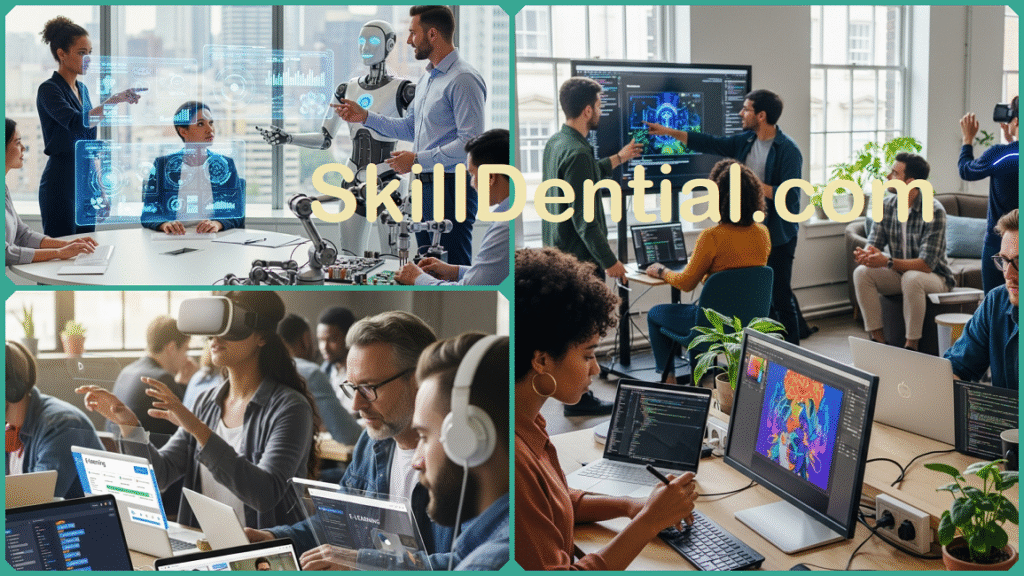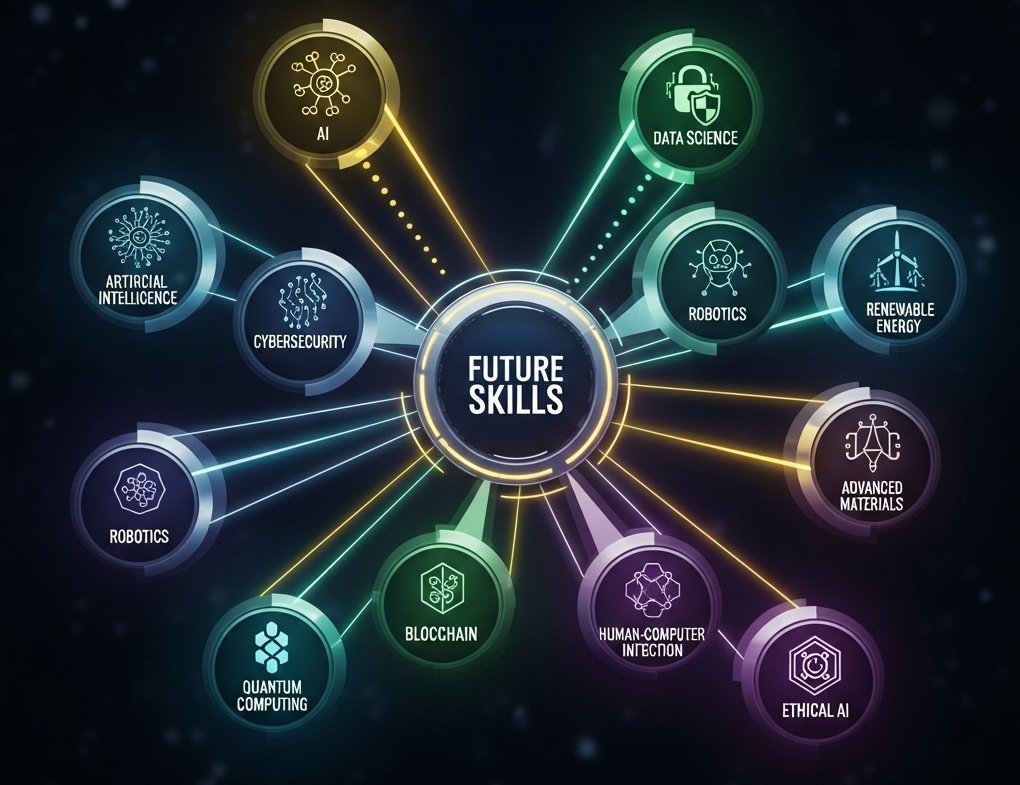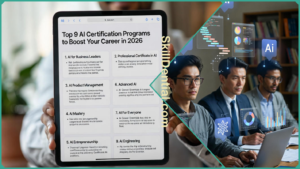In an era profoundly shaped by rapid technological advancements, constantly evolving job markets, and continuously shifting global economies, staying ahead and remaining competitive means having a clear understanding of which skills are going to be in high demand in the near future. This knowledge is vital not only for career changers and recent graduates but also for current professionals who want to stay relevant, as well as HR specialists who are responsible for workforce planning and talent acquisition.
Having a thorough understanding of these future skills is essential for anyone aiming to secure meaningful, well-paying, and deeply fulfilling work opportunities in today’s increasingly complex, fast-paced, and ever-evolving professional landscape. This knowledge not only enhances career prospects but also ensures adaptability and long-term success in a rapidly changing job market.

This post explores 11 crucial skills that are expected to become the most valuable and in-demand in the years ahead. It provides practical and actionable guidance on how to effectively develop and master these skills. Whether you are looking to make a significant career change, ensure your current job remains relevant and future-proof, or seek to hire the best and most qualified talent, this comprehensive guide is based on thorough research and industry insights designed to help you succeed and thrive in a rapidly evolving professional landscape.
Key Concepts and Frameworks: What Makes a Skill Future-Proof?
Understanding what truly makes a skill future-proof is absolutely crucial before diving into exploring the specific skills that are projected to be in high demand. According to the World Economic Forum’s Future of Jobs Report 2025, future-proof skills represent a carefully balanced blend of several core capabilities that effectively address and adapt to the rapidly evolving demands of the global labor market.
These skills are essential for effectively navigating the many uncertainties and ongoing, continuous changes that characterize today’s ever-evolving workforce landscape.
Analytical and Critical Thinking
Analytical thinking is the crucial ability to effectively solve complex and multifaceted problems by carefully interpreting data and leveraging strong logical reasoning skills. In today’s rapidly evolving world, marked by a significant surge in digital transformation and widespread automation, possessing advanced skills in data analysis and strategic problem-solving has become absolutely fundamental across a wide range of industries and sectors.
According to the latest report from the World Economic Forum (WEF), an impressive 69% of surveyed employers have identified analytical thinking as one of the most important and highly prioritized skills that will be essential for the workforce by the year 2025.
Technological Literacy
Technological literacy encompasses a strong proficiency and understanding of emerging and rapidly evolving technologies such as artificial intelligence (AI), big data analytics, cloud computing platforms, cybersecurity measures, and various programming languages.
In today’s job market, employers are increasingly prioritizing workers who not only possess these technical skills but are also capable of effectively harnessing these advanced tools to significantly boost productivity and drive innovation within their organizations.
According to the World Economic Forum (WEF) report, technological literacy combined with AI-related skills represents one of the fastest-growing areas of expertise, with more than half of employers anticipating a substantial increase in demand for professionals who are well-versed in these competencies over the coming years.
Human Skills
Despite the rapid advancement of automation technology and the increasing capabilities of machines, uniquely human skills such as creativity, emotional intelligence (EQ), collaboration, and adaptability continue to be absolutely indispensable in the workplace.
These crucial abilities enable innovation, promote effective teamwork, and foster strong leadership — all qualities that machines and automated systems struggle to replicate or replace. Creativity, in particular, is ranked as one of the core skills by 57% of employers surveyed, highlighting its vital role in driving new ideas and solutions.
Additionally, emotional intelligence is gaining widespread recognition as an essential skill for success in modern workplaces, where understanding and managing emotions is critical to building productive relationships and navigating complex social dynamics.
Resilience and Learning Mindset
The capacity to adapt, evolve, and grow effectively amid continuous and rapid change is a defining characteristic of the future workforce. Key qualities such as resilience, flexibility, agility, curiosity, and a strong commitment to lifelong learning empower individuals to successfully navigate through frequent market disruptions and constantly evolving job requirements.
The World Economic Forum (WEF) report specifically highlights resilience, flexibility, and agility, with 67% of respondents emphasizing their importance, alongside continuous learning, as essential skills for ensuring career longevity and sustained professional success in an ever-changing employment landscape.
Diverse and Interdisciplinary Skill Sets
Employers today no longer focus solely on candidates who possess narrow specialization in a single area but instead prefer individuals who bring a diverse and well-rounded skill portfolio. This portfolio ideally combines deep technical expertise with strong interpersonal skills and advanced cognitive abilities.
Such a combination enables workers not only to perform specific tasks but also to contribute strategically to organizational goals and collaborate effectively within complex, technology-enabled work environments that demand adaptability and teamwork.
In Summary
Future-proof skills are essential abilities that enable individuals to successfully navigate and excel in an ever-evolving job market, which is increasingly influenced by rapid advancements in technology, the forces of globalization, and significant societal changes.
These skills provide a strong foundation and adaptability, allowing people to remain relevant and competitive despite continuous transformations. They are fundamentally rooted in:
- Critical thinking and data-driven problem solving
- Technological fluency, including AI and digital tools
- Human-centric skills like creativity, Emotional Quotient (EQ), and collaboration
- Resilience and a proactive learning mindset
By actively cultivating and continuously developing these essential core competencies, workers can significantly enhance their ability to adapt to rapidly evolving roles and changing job requirements. This proactive approach ensures they not only meet current demands but also sustain long-term career relevance and success well into 2030 and beyond, despite the dynamic nature of the future workplace.
The Future-Demand Skills
As the global workforce evolves in response to rapid technological advancements, economic shifts, and societal transformations, certain skills are emerging as critical for career growth and job security. The World Economic Forum’s Future of Jobs Report 2025 emphasizes a blend of cognitive, technical, and interpersonal skills that will be in high demand across industries.

Below are the 11 essential key skills that professionals should focus on developing right now, accompanied by practical and actionable steps to effectively acquire and strengthen these abilities.
Analytical Thinking and Problem Solving
Analytical thinking involves the careful interpretation of complex data sets, the identification of meaningful patterns, and the application of logical reasoning to devise effective and innovative solutions. This critical skill serves as a foundational element for making informed decisions across a wide range of fields, including technology, finance, healthcare, marketing, and many others.
In fact, employers consistently rank analytical thinking among the top essential skills required for success in 2025, underscoring its rapidly growing importance in an increasingly data-driven and technology-focused world.
How to develop:
- Take courses like “Data Analytics” on Coursera and edX to learn data interpretation and statistics.
- Read influential books such as Thinking, Fast and Slow by Daniel Kahneman to understand cognitive biases and decision-making.
- Engage in practice projects by analyzing real datasets on platforms like Kaggle or Google Data Studio.
Digital Literacy and Technology Proficiency
Developing a solid understanding of digital platforms, programming fundamentals, cloud computing technologies, and the basics of cybersecurity is essential in today’s technology-driven world. This comprehensive knowledge encompasses proficiency in popular coding languages such as Python and JavaScript, which form the backbone of many modern applications.
Additionally, gaining familiarity with artificial intelligence integration and its practical applications is becoming increasingly important. Equally critical is the ability to maintain strong cyber hygiene practices to protect sensitive information and ensure secure operations. These skills and competencies are in high demand as businesses across various industries increasingly rely on digital solutions and robust security measures to thrive and stay competitive.
How to develop:
- Enroll in coding bootcamps like Codecademy or freeCodeCamp to build programming skills.
- Obtain certifications such as Google IT Support or CompTIA Cybersecurity for foundational tech knowledge.
- Experiment with AI tools and platforms to gain hands-on experience, integrating automation into workflows.
Artificial Intelligence and Machine Learning
AI skills, including advanced machine learning techniques, sophisticated automation design, and complex algorithm development, offer a significant competitive advantage across various fields such as engineering, data science, and business innovation. These capabilities are increasingly essential for driving efficiency, innovation, and strategic growth.
The report emphasizes that AI and Big Data are among the fastest-growing skill areas expected to see substantial demand and expansion by the year 2030, reflecting their critical role in shaping future technological and economic landscapes.
How to develop:
- Study courses such as Stanford’s “Machine Learning” on Coursera or Google AI’s specialization tracks.
- Build and experiment with projects using frameworks like TensorFlow or scikit-learn.
- Keep current by following AI research publications and industry newsletters (e.g., arXiv.org).
Creativity and Innovation
Creativity remains the key factor that sets human work apart in an increasingly automated and technology-driven workforce. It acts as the essential fuel behind innovation, inspiring the development of new and improved products, services, and processes.
This creative spark drives a significant competitive advantage, enabling businesses and individuals to approach problems with unique and original solutions that machines alone cannot generate.
How to develop:
- Participate in design thinking workshops or learn online through platforms like IDEO U.
- Practice brainstorming and creative problem-solving exercises.
- Read books such as Creative Confidence by Tom K/elley to embrace innovation skills.
Emotional Intelligence (EQ) and Social Skills
In today’s evolving hybrid and collaborative work environments, emotional intelligence, often referred to as EQ, which encompasses the ability to perceive, understand, manage, and positively influence emotions, has become essential.
This crucial skill not only supports effective leadership but also enhances team dynamics and strengthens customer relations. These are all highly sought-after traits that employers value significantly in their workforce.
How to develop:
- Read Emotional Intelligence by Daniel Goleman for foundational theory and practice.
- Practice active listening, empathy, and mindful communication during interactions.
- Take interpersonal and leadership skills courses available through LinkedIn Learning or similar.
Resilience, Adaptability, and Flexibility
Career landscapes are increasingly volatile and constantly evolving, frequently disrupted by rapid advancements in technology and sudden shifts in market dynamics. The ability to demonstrate resilience—the capacity to quickly recover and bounce back from setbacks—and adaptability—the skill to adjust effectively to new and changing conditions—are essential for maintaining high levels of productivity and success amid ongoing uncertainty and change.
How to develop:
- Adopt mindfulness and stress management techniques through apps or programs.
- Embrace challenges as learning opportunities, reflect on growth and change.
- Take courses on mindset and adaptability, such as on Mind Tools or Coursera.
Leadership and People Management
Effective leadership involves a clear and inspiring vision, deep empathy for team members, strong conflict resolution abilities, and the skill to motivate and engage teams consistently. These essential skills are expected to remain crucial in the future as businesses increasingly prioritize talent development, foster positive organizational culture, and strive to build resilient, high-performing teams that can adapt to changing environments.
How to develop:
- Attend leadership programs from prestigious institutions like Harvard Online or Coursera.
- Read books like Leaders Eat Last by Simon Sinek to understand servant leadership.
- Volunteer for mentorship or team lead roles to gain practical leadership experience.
Data Literacy and Interpretation
Beyond simply analyzing data, it is crucial to interpret that data within specific business contexts and effectively communicate the resulting insights to a wide range of audiences, as this process plays a vital role in driving informed strategic decisions.
Employers highly value workers who possess the ability to translate raw, complex data into clear, actionable narratives that can guide business strategy and operational improvements.
How to develop:
- Train in data visualization tools like Tableau or Power BI to make data accessible.
- Improve presentation and communication skills through workshops.
- Participate in business intelligence projects to practice storytelling with data.
Cybersecurity Awareness
As the number and sophistication of cyber threats continue to increase at an alarming rate, having a solid foundation of basic cybersecurity knowledge across all roles within an organization becomes essential. Every employee must have a clear understanding of safe digital practices to protect sensitive information and prevent unauthorized access.
Additionally, employees need to be aware of the significant impact that security breaches can have not only on the company’s operations but also on its reputation and financial stability.
How to develop:
- Obtain certifications such as CISSP or CompTIA Security+ for formal training.
- Take online cybersecurity awareness modules.
- Practice using gamified platforms like TryHackMe or Hack The Box for hands-on cyber defense skills.
Project Management and Organizational Skills
Effectively coordinating resources, managing timelines, and engaging stakeholders is absolutely crucial when handling complex projects across various industries. Mastering these skills not only ensures the timely and successful delivery of high-quality outcomes but also significantly enhances overall operational efficiency and productivity throughout the project lifecycle.
How to develop:
- Pursue certifications like PMP or Agile Scrum Master for formal recognition.
- Use project management software such as Asana or Trello regularly.
- Gain experience leading small projects or simulations.
Continuous Learning and Curiosity
The willingness to continuously keep skills current and actively explore new technologies or innovative methods serves as the ultimate safeguard for one’s career in today’s fast-paced professional world. Lifelong learners, who consistently seek out opportunities for growth and development, adapt most effectively to the ever-evolving job markets and rapidly changing innovation cycles, ensuring long-term success and relevance in their fields.
How to develop:
- Regularly enroll in MOOCs, webinars, and professional workshops.
- Create and follow a personal learning plan with clear goals.
- Cultivate curiosity by exploring diverse topics outside industry comfort zones.
This comprehensive and detailed overview carefully connects each essential skill to well-established, credible research sources and provides clear, actionable development pathways. It is thoughtfully designed to serve a wide audience, including career changers seeking new directions, students preparing for the workforce, experienced professionals aiming to enhance their expertise, and HR specialists dedicated to future-proofing careers in an ever-evolving job market.
Current Trends Impacting Skills Demand
The nature of work and the specific skills that employers require are evolving and transforming at an exceptionally rapid pace due to the combined and powerful influences of technological advancements, environmental changes, and shifting societal expectations.
Gaining a clear understanding of these emerging trends is crucial for individuals and organizations alike, as it enables them to strategically align career development efforts and workforce planning with the anticipated demands and opportunities of the future job market in a more effective and informed manner.
Automation and AI Adoption
The automation of routine and repetitive tasks using advanced robotics, artificial intelligence, and sophisticated software systems is rapidly accelerating across a wide range of industries. This significant technological shift is leading to a decreased demand for manual, transactional roles that involve repetitive and straightforward activities.
At the same time, it is driving an increased need for workers to possess higher-order cognitive skills, including strong analytical thinking, complex problem-solving abilities, and advanced digital fluency. Consequently, employees must focus on developing and enhancing skills that complement and work alongside intelligent machines, rather than attempting to compete directly with them.
Digital Transformation and Hybrid Work
The widespread and rapid adoption of digital technologies has significantly transformed traditional work models that were once predominantly office-based. In today’s professional landscape, hybrid and fully remote work environments have become the norm, demanding a high level of proficiency with various digital collaboration tools, cloud computing platforms, and a strong awareness of cybersecurity best practices.
Consequently, being tech-savvy and possessing excellent communication skills have become essential for ensuring efficient team coordination, maintaining seamless workflow, and maximizing productivity in these increasingly dispersed and virtual work settings.
Sustainability and ESG Priorities
Environmental, Social, and Governance (ESG) criteria are becoming increasingly central and integral to corporate strategies on a global scale. This growing emphasis on ESG principles is driving a significant rise in demand for green skills, which encompass a broad range of expertise, such as a deep understanding of sustainable business practices, comprehensive knowledge of environmental regulations, and familiarity with social responsibility frameworks.
As companies strive to align their operations with these critical values, professionals who possess strong capabilities in sustainability assessment, transparent reporting, and innovative approaches to environmental and social challenges are becoming highly sought after across various industries and sectors.
Data Explosion and Data-Driven Decision Making
The volume of data generated globally continues to grow at an exponential rate, expanding far beyond previous estimates. Modern organizations across various industries increasingly rely heavily on data to drive their strategic decisions, improve efficiency, and optimize operations in highly competitive markets.
As a result, possessing skills in data analysis, interpretation, and visualization has become absolutely critical for a wide range of roles spanning business, healthcare, marketing, technology, and many other fields. These skills enable professionals to extract meaningful insights and make informed decisions that positively impact organizational success.
Aligning Career Development with These Trends
To effectively future-proof careers in an ever-evolving job market, it is absolutely essential to commit to continuous upskilling, particularly in areas that are closely aligned with emerging industry trends and technological advancements.
Professionals should prioritize developing a robust combination of technical expertise, such as proficiency in artificial intelligence, data analytics, and other cutting-edge technologies, alongside cultivating critical human-centric skills.
These include adaptability, effective collaboration, emotional intelligence, and problem-solving abilities, which collectively empower workers to navigate and succeed in increasingly complex, technology-enhanced work environments. By balancing these skill sets, individuals can ensure their careers remain resilient and relevant well into the future.
FAQs
Why are soft skills important if technology is advancing so fast?
Soft skills such as creativity, emotional intelligence (EQ), adaptability, and effective communication are crucial complements to technical skills. As automation and AI take over routine tasks, human-centric skills enable people to collaborate effectively, innovate, manage emotions, and lead teams—capabilities machines cannot easily replicate. These skills foster productive teamwork, inspire innovation, and create resilient, inclusive work cultures, helping individuals stand out and succeed in tech-driven environments.
How long does it take to learn these future skills?
The timeframe varies depending on the skill. Some technical and analytical skills can be acquired in weeks through focused online courses or bootcamps. However, more complex and interpersonal abilities like leadership, resilience, and emotional intelligence require continual practice, real-world application, and ongoing development. A commitment to lifelong learning is essential for mastering these skills and adapting to evolving job demands.
Can these skills apply across industries?
Many in-demand skills, such as analytical thinking, digital literacy, communication, and adaptability, are highly transferable and valued across a wide range of sectors, including healthcare, finance, technology, marketing, manufacturing, and education. This versatility makes these skills particularly valuable for career changers and professionals seeking to future-proof their careers.
What are some affordable ways to learn these skills?
Budget-friendly and flexible learning options abound. Massive Open Online Courses (MOOCs) on platforms like Coursera, edX, and freeCodeCamp offer high-quality courses often accessible for free or low cost. Additionally, reading relevant books, attending local workshops or webinars, joining online forums, and participating in project-based learning can enhance skill acquisition without breaking the bank.
How do I stay motivated while learning new skills?
Maintaining motivation is easier when learners set clear, achievable goals and regularly track their progress. Engaging with learning communities, study groups, or mentors provides social support and accountability. Applying new knowledge to real projects or challenges reinforces learning and creates a sense of accomplishment, further fueling motivation to continue developing skills.
In Conclusion
Preparing for the future workforce means prioritizing a balanced mix of technical expertise and human-centric skills. The 11 skills outlined in this guide—ranging from analytical thinking and AI proficiency to emotional intelligence and resilience—form the foundation for career longevity, adaptability, and growth in an ever-evolving job landscape.
As organizations integrate AI and automation at unprecedented levels, the future workplace will be defined not just by what machines can do, but by how effectively people collaborate with technology and each other. The most successful professionals will be those who cultivate uniquely human qualities such as creativity, empathy, curiosity, and leadership, alongside mastering technical capabilities.
Investing time in continuous learning and practical application today empowers career changers, recent graduates, working professionals, and HR leaders to confidently navigate the uncertainties of tomorrow’s workforce. By embedding this diverse skill set, individuals and organizations position themselves to thrive amid disruption, drive innovation, and shape the future of work.
In the rapidly evolving age of artificial intelligence and ongoing digital transformation, the unique combination of human potential and advanced technological fluency represents the ultimate competitive advantage.
This powerful blend is essential for building a resilient, adaptable, and future-ready workforce that can thrive not only in 2025 but well beyond, ensuring sustained success in an increasingly complex and technology-driven world.
Discover more from SkillDential
Subscribe to get the latest posts sent to your email.


